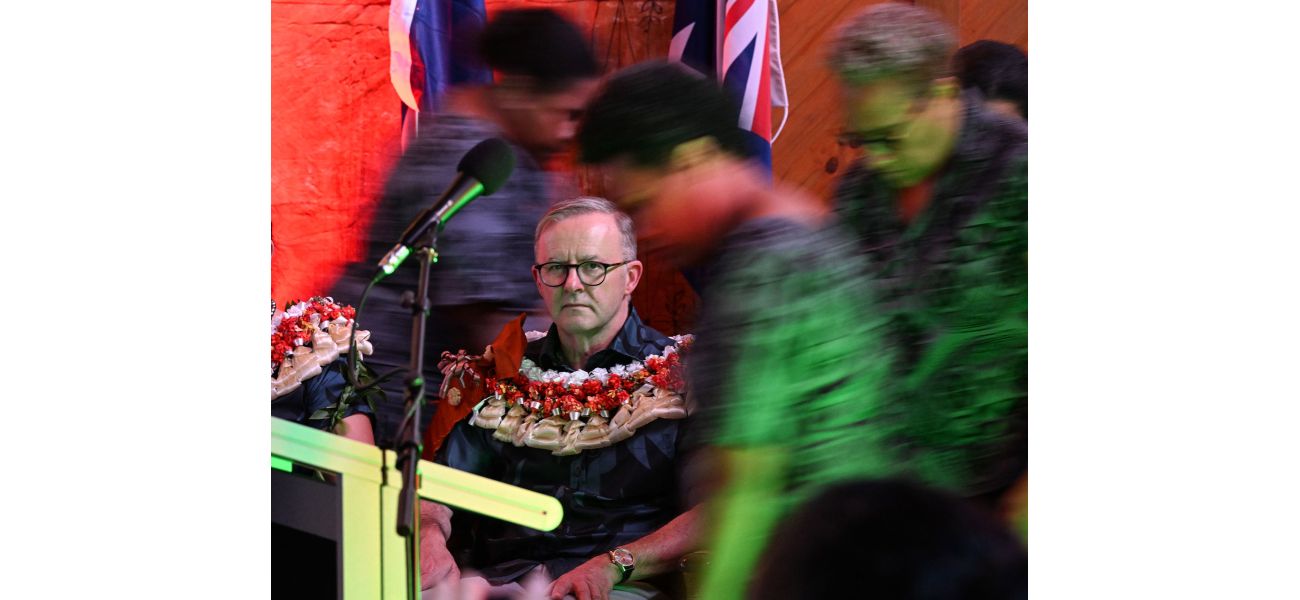Australia under fire at Commonwealth meeting for their severe punishment of death sentences.
Small Pacific nations criticize wealthy countries like Australia for their stance on climate change.
October 24th 2024.

At this week's Commonwealth Heads of Government Meeting in Samoa, Australia is facing criticism for not taking enough action to combat climate change, which is putting smaller nations at risk. A newly published report has revealed that despite only making up six percent of the group's total population, Australia, Canada, and the United Kingdom are responsible for the majority of carbon emissions within the Commonwealth.
This is concerning given that the Australian government has positioned itself as a leader in the fight against climate change. However, according to the report by the Fossil Fuel Non-Proliferation Treaty Initiative, Australia's fossil fuel exports are second only to Russia and the country has the largest pipeline of coal export projects awaiting approval in the world. The report's authors have called out Australia's lack of action, stating that it goes against the nation's rhetoric on climate leadership and Pacific solidarity.
The report, titled "Uncommon Wealth: Fossil Fuel Expansion in the Commonwealth Dominated by Three Wealthy Countries," also highlights that while wealthier nations like Australia emit more carbon, it is the smaller Commonwealth nations that will suffer the most severe consequences. Particularly vulnerable are Pacific nations, which are already facing the effects of rising sea levels and natural disasters caused by climate change. In response, several of these nations have called on Australia, Canada, and the UK to decrease their production of coal and gas.
Tuvalu's Home Affairs Minister Maina Vakafua Talia has expressed the gravity of the situation, stating that it is a death sentence for smaller nations if larger ones continue to open new fossil fuel projects. He has called for a united effort among Commonwealth countries to keep their Paris Agreement commitments of limiting warming to 1.5 degrees and to provide fair financing for countries like Tuvalu during the transition to renewable energy.
Vanuatu's special envoy for climate change, Ralph Regenvanu, shares this sentiment and has urged the wealthier Commonwealth nations to not prioritize short-term gains over the future of vulnerable nations. Foreign Minister Penny Wong, who is attending the meeting alongside Prime Minister Anthony Albanese, has acknowledged the need for all countries to take responsibility in tackling climate change. She has also spoken to the prime minister of Tuvalu about Australia's transition to a renewable energy economy, which she recognizes as a significant undertaking.
In addition to Australia, the United Kingdom's Prime Minister Sir Keir Starmer is also present at the meeting, as well as King Charles III. However, notable leaders such as Canada's Justin Trudeau, India's Narendra Modi, and South Africa's Cyril Ramaphosa have chosen to skip the event in favor of attending a meeting in Russia with Vladimir Putin and Xi Jinping. Despite these absences, the Commonwealth countries remain committed to working together and with other nations to transition to renewable energy and combat the global climate crisis.
This is concerning given that the Australian government has positioned itself as a leader in the fight against climate change. However, according to the report by the Fossil Fuel Non-Proliferation Treaty Initiative, Australia's fossil fuel exports are second only to Russia and the country has the largest pipeline of coal export projects awaiting approval in the world. The report's authors have called out Australia's lack of action, stating that it goes against the nation's rhetoric on climate leadership and Pacific solidarity.
The report, titled "Uncommon Wealth: Fossil Fuel Expansion in the Commonwealth Dominated by Three Wealthy Countries," also highlights that while wealthier nations like Australia emit more carbon, it is the smaller Commonwealth nations that will suffer the most severe consequences. Particularly vulnerable are Pacific nations, which are already facing the effects of rising sea levels and natural disasters caused by climate change. In response, several of these nations have called on Australia, Canada, and the UK to decrease their production of coal and gas.
Tuvalu's Home Affairs Minister Maina Vakafua Talia has expressed the gravity of the situation, stating that it is a death sentence for smaller nations if larger ones continue to open new fossil fuel projects. He has called for a united effort among Commonwealth countries to keep their Paris Agreement commitments of limiting warming to 1.5 degrees and to provide fair financing for countries like Tuvalu during the transition to renewable energy.
Vanuatu's special envoy for climate change, Ralph Regenvanu, shares this sentiment and has urged the wealthier Commonwealth nations to not prioritize short-term gains over the future of vulnerable nations. Foreign Minister Penny Wong, who is attending the meeting alongside Prime Minister Anthony Albanese, has acknowledged the need for all countries to take responsibility in tackling climate change. She has also spoken to the prime minister of Tuvalu about Australia's transition to a renewable energy economy, which she recognizes as a significant undertaking.
In addition to Australia, the United Kingdom's Prime Minister Sir Keir Starmer is also present at the meeting, as well as King Charles III. However, notable leaders such as Canada's Justin Trudeau, India's Narendra Modi, and South Africa's Cyril Ramaphosa have chosen to skip the event in favor of attending a meeting in Russia with Vladimir Putin and Xi Jinping. Despite these absences, the Commonwealth countries remain committed to working together and with other nations to transition to renewable energy and combat the global climate crisis.
[This article has been trending online recently and has been generated with AI. Your feed is customized.]
[Generative AI is experimental.]
0
0
Submit Comment





